- Home
- Robert B. Parker
Family Honor Page 2
Family Honor Read online
Page 2
“Dwindle,” she said aloud.
The dog turned her head and cocked it slightly and pricked her big ears a little forward. Sunny drank some wine.
“Dwindle, dwindle, dwindle.”
Her friend Julie had said once to her that she was too stubborn to dwindle. That her self was so unquenchable, her autonomy needs so sharp, that no one could finally break her to a marriage. Julie was a therapist herself, though not by any means Sunny’s, and maybe she knew something. Whatever had happened they had been forced to admit it didn’t work, after a nine-year struggle. Sitting across from one another in the restaurant of a suburban hotel, they had begun the dissolution.
“What do you want?” Richie had said.
“Nothing.”
Richie had smiled a little bit.
“Hell,” he’d said. “I’ll give you twice that.”
She had smiled an even smaller smile than Richie’s.
“I can’t strike out on my own at your expense,” she had said.
“What about the dog?”
She had been silent, trying to assess what she could stand.
“I want the dog,” she had said. “You can visit.”
He had smiled the small smile again.
“Okay,” he had said. “But she’s not used to squalor. You keep the house.”
“I can’t live in the house.”
“Sell it. Buy one you can live in.”
Sunny had been quiet for a long time, she remembered, wanting to put out her hand to Richie, wanting to say, I don’t mean it, let’s go home. Knowing she could not.
“This is awful,” she said finally.
“Yes.”
And it was done.
Out through the French doors the fishing boat had finally inched out of sight and the horizon was empty. Sunny pulled the dog onto her lap. And sang to her.
“Two drifters, off to see the world/There’s such a lot of world to see.”
She couldn’t remember the words right. Maybe it was two dreamers. Too much wine. The dog lapped the back of Sunny’s hand industriously, her tail thumping. Sunny sipped a little more of her wine. Got to go slow here. She sang again to the dog.
She wanted to be alone, now she was alone. And she didn’t want to be alone. Of course, she wasn’t really alone exactly. She had a husband—ex-husband—she could call on. She had friends. She had parents, even her revolting sister. But whatever this thing was, this as yet unarticulated need that clenched her soul like some sort of psychic cramp, required her to put aside the people who would compromise her aloneness. You lose, you lose; you win, you lose.
“You and me,” she said to the dog. “You and me against the world.”
She hugged the dog against her chest, the dog wriggling to lap at her ear. Sunny’s eyes blurred a little with tears. She rocked the dog gently, sitting on the floor with the jug of wine beside her and her feet outstretched.
“Probably enough wine,” she said out loud, and continued to rock.
CHAPTER 1
One of the good things about being a woman in my profession is that there’s not many of us, so there’s a lot of work available. One of the bad things is figuring out where to carry the gun. When I started as a cop I simply carried the department-issue 9-mm on my gun belt like everyone else. But when I was promoted to detective second grade and was working plainclothes, my problems began. The guys wore their guns on their belts under a jacket, or they hung their shirt out over it. I didn’t own a belt that would support the weight of a handgun. Some of them wore a small piece in an ankle holster. But I am 5’6” and 115 pounds, and wearing anything bigger than an ankle bracelet makes me walk as though I were injured. I also like to wear skirts sometimes and skirt-with-ankle-holster is just not a good look, however carefully coordinated. A shoulder holster is uncomfortable, and looks terrible under clothes. Carrying the thing in my purse meant that it would take me fifteen minutes to find it, and unless I was facing a really slow assailant, I would need to get it out quicker than that. My sister Elizabeth suggested that I had plenty of room to carry the gun in my bra. I have never much liked Elizabeth.
At the gun store, the clerk wanted to show me a Lady-Smith. I declined on principle, and bought a Smith & Wesson .38 Special with a two-inch barrel. With a barrel that short you could probably miss a hippopotamus at thirty feet. But any serious shooting I knew anything about took place at a range of about three feet, and at that range the two-inch barrel was fine. I wore my .38 Special on a wider-than-usual leather belt in a speed holster at the small of my back under a jacket.
Which is the way I was wearing it on an early morning at the beginning of September as I drove through a light rain up a winding half-mile driveway in South Natick, dressed to the teeth in a blue pant suit, a white silk tee shirt, a simple gold chain, and a fabulous pair of matching heels. I was calling on a lot of money. The driveway seemed to be made of crushed seashells. There were bright green trees along each side, made even greener by the rain. Flowering shrubs bloomed in serendipitous places among the trees. The whole landscape, refracted slightly by the rain, made me think of Monet. At the last curve in the driveway the trees gave onto a rolling sweep of green lawn, upon which a white house sat like a great gem on a jeweler’s pad. The vast front was columned, and the Palladian windows seemed two stories high. The drive widened into a circle in front of the house, and then continued around back where, no doubt, unsightly necessities like the garage were hidden.
As soon as I parked the car a black man wearing a white coat came out of the house and opened the door for me. I handed him one of my business cards.
“Ms. Randall,” I said. “For Mr. Patton.”
“Yes, ma’am,” the black man said. “Mr. Patton is expecting you.”
He preceded me to the door and opened it for me. A good-looking black woman in a little French maid’s outfit waited in the absolutely massive front hallway.
“Ms. Randall,” the man said and handed the maid my card.
She took it without looking at it and said, “This way, please, Ms. Randall.”
The foyer was very air-conditioned, even though the rainy September day was not very hot. The maid walked briskly ahead of me, her heels ringing on the stone floor. If her shoes were as uncomfortable as mine, she was as stoic about it as I was. My heels rang on the stone floor, too. The foyer was decorated with some expensively framed landscape paintings, which were hideous, but probably made up for it by costing a lot. Through the French doors at the far end of the foyer I could see a croquet lawn and, beyond that, a more conventional lawn that sloped down to the river at the far bottom.
The maid opened a door near the end of the foyer and stood aside. I stepped in. The air-conditioning was even more forceful than it had been in the foyer. The room was a man’s study, and it absolutely howled of decorator. Bookshelves were filled with leather-bound books artfully arranged. The walls were done in a dark burgundy. The drapes matched the walls but with a golden triangular pattern in them. There was a fireplace that I could have stood upright in on the wall opposite. There was a fire in it. The ceiling was far above my head. There was a massive reddish wooden desk along the left wall of the room with Palladian windows opening behind it. The deep colorful rugs had been woven somewhere in the far east. A huge globe of the world was on its own dark wooden stand near the fireplace. It was lit from within. Above the fireplace was a formal portrait of a good-looking woman with smooth blond hair and the contemptuous smile of a well-fed house cat.
The maid marched across the rug and put my card on the desk and announced, “Ms. Randall.”
The man behind the desk said, “Thank you, Billie,” and the maid turned and marched out past me and closed the door. The man looked at my card for a little while without picking it up, and then he looked up at me and smiled. It was an effective smile and I could tell t
hat he knew it. The little crinkles at his eyes made him look kind though wise, and the parentheses around his mouth gave him a look of firm resolve.
“Sunny Randall,” he said, almost as if he were speaking to himself. Then he rose and came around the desk. He was athletic-looking, taller than my ex-husband, with blue eyes and a healthy outdoor look about him. He put his hand out as he walked across the carpet.
“Brock Patton,” he said.
“How very nice to meet you,” I said.
He stood quite close to me as we shook hands, which allowed him to tower over me. I didn’t step back.
“Where did you get a name like Sunny Randall?” he said.
“From my father,” I said. “He was a great football fan and I guess there was some football person with that name.”
“You guess? You don’t know?”
“I hate football.”
He laughed as if I had said something precocious for a little girl. “Well, by God, Sunny Randall, you may just do.”
“That’s often the case, Mr. Patton.”
“I’ll bet it is.”
Patton went around his desk and sat. I took a seat in front of the desk and crossed my legs and admired my shoes for a moment. Of course they were uncomfortable; they looked great. Patton appeared to admire them, too.
“Well,” he said after a time.
I smiled.
“Well,” he said again. “I guess there’s nothing to do but plunge right in.”
I nodded.
“My daughter has run off,” he said.
I nodded again.
“She’s fifteen,” he said.
Nod.
“My wife and I thought somehow a woman might be the best choice to look for her.”
“You’re sure she’s run away?” I said.
“Yes.”
“She ever do this before?”
“Yes.”
“Where did she run to before?”
“She didn’t get far. Police picked her up hitchhiking with three other kids . . . boys. We were able to keep it out of the papers.”
“Why does she run away?” I said.
Patton shook his head slowly, and bit his lower lip for a moment. Both movements seemed practiced.
“Teenaged girls,” he said.
“I was a teenaged girl,” I said.
“And I’ll bet a cute one, Sunny.”
“Indescribably,” I said, “but I didn’t run away.”
“Well, of course, not all teenagers . . .”
“Things all right here?” I said.
“Here?”
“Yes. This is what she ran away from.”
“Oh, well, I suppose . . . everything is fine here.”
I nodded. To my right the fireplace crackled and danced. No heat radiated from it. The air-conditioned room remained cold. The windows fogged with condensation in which the rain streaked little patterns.
“So why did she run away?”
“Really, Sunny,” Patton said. “I am trying to decide whether to hire you to find her.”
“And I’m trying to decide, Brock, if you do offer me the job, whether I wish to take it.”
“Awfully feisty,” Patton said, “for someone so attractive.”
I decided not to blush prettily. He stood suddenly.
“Do you have a gun, Sunny?”
“Yes.”
“With you?”
“Yes.”
“Can you shoot it?”
“Yes.”
“I’m something of a shooter myself,” Patton said. “I’d like to see you shoot. Do you mind walking outside in the rain with me?”
Other than the fact that my hair would get wet and turn into limp corn silk? But there was something interesting happening here. I wasn’t sure what it was, but I didn’t want to miss it.
“I don’t mind,” I said.
He took an umbrella from a stand beside the French doors behind his desk. He opened the doors and we went out into the rain. He held the umbrella so that I had to put my arm through his to stay under cover. We walked across the soft wet grass, my heels sinking in uncomfortably. Maybe there should be a new rule about wearing heels when I was working. Maybe the new rule would be, never. On the far side of the croquet lawn, and shielded from it by a grove of trees, was an open shed with a sort of counter across one side and a wood-shingled roof. We went to the shed and under the roof. Patton closed the umbrella. He took a key from his pocket and opened a cabinet under the counter and took out something that looked like a small clay frisbee.
“What have you for a weapon,” Patton said.
I took out my .38 Special.
“Well, very quick,” he said. “Think you could hit anything with that?”
There was a test going on, and I didn’t know quite what was being tested.
“Probably,” I said.
He smiled down at me.
“I doubt that you can hit much with that thing,” he said.
“What is your plan?” I said.
“I’ll toss this in the air, and you put a bullet through it.”
If I did that using a handgun with a two-inch barrel it would be by accident. He knew it.
“I’ll toss it up here,” he said, “it’s safe to fire toward the river.”
He looked at me and raised his eyebrows. I nodded. He smiled as if to himself and stepped out of the shed and tossed the disk maybe thirty feet straight up into the air. I didn’t move. The disk hit its zenith and came down and landed softly on the wet grass about eight feet beyond the shed. And lay on its side. I walked out of the shed, and over to the disk, and standing directly above it, I put a bullet through the middle of it from a distance of about eighteen inches. The disk shattered. Patton stared at me.
“I don’t need to be able to shoot something falling through the air thirty feet away,” I said. “This gun is quite effective at this range, Brock, which is about the only range I’ll ever need it for.”
I put the gun away. Patton nodded and stared at the disk fragments for a moment or two; then he picked up the umbrella and opened it and handed it to me.
“Come back in,” he said. “I’d like you to meet my wife.”
Then he walked away bareheaded in the nice rain. I followed him, alone under the umbrella.
CHAPTER 2
Betty Patton was far too perfect. She annoyed me on sight in the same way Martha Stewart does. Her hair was too smooth. Her makeup was too subtle. Her legs were too shapely. Her pale yellow linen dress fit her much too well. She sat with one perfect leg crossed over the other in a low armchair in the study sipping coffee. The cup and saucer were bone-colored. There was a slim gold band around the rim of the cup. When Brock introduced us, she smiled without rising and offered her hand gracefully. Her handshake was firm but feminine. She said she was pleased to meet me. She called me Ms. Randall. I don’t know how she did it, but any neutral observer would have known at once that Betty was the employer, and I was the employee.
“You’ve been shooting,” Betty said.
“Yes.”
“Can she shoot, Brock?”
“Well, sort of,” Brock said.
“Did you ask Brock to shoot, Ms. Randall?”
“No,” I said. “I didn’t.”
“Oh, well, you’ve disappointed him badly then. That was the real point of the exercise.”
I had nothing to say about that, and I said it. The decorative fire was still burning vigorously. A servant must have fed it while we were out. The air-conditioning was still fogging the glass in the French doors.
“I think Ms. Randall is who we need,” Brock said.
Betty smiled and sipped her coffee. She didn’t spill a drop on her dr
ess. She wouldn’t.
“I rather expected you to think so,” Betty said when the elegant cup was perfectly centered back in the elegant saucer. “She’s quite pretty.”
“She has a good background,” Brock said. “She is straightforward. And I have the sense that she is discreet.”
Discreet about what?
“Do you think you can find our Millicent?” Betty said, leaning forward slightly as if to make her question more compelling. Like her husband, she seemed incapable of an unrehearsed gesture.
“Probably,” I said.
“Because?”
“Because I’m really quite good at this.”
Betty smiled interiorly.
“Odd profession for a woman,” she said.
“Everyone says that.”
“Really?”
I knew it would annoy her to be clumped in with everyone.
“Yes,” I said. “Usually they say it just as you did.”
“Are you married?”
“No, I’m not.”
“Ever been married?”
“Yes.”
“So you’re not a lesbian.”
“Having been married doesn’t prove it.”
“Well, are you?”
“I guess that’s not germane.”
Betty stared at me for a moment. A perfect little frown line appeared between her flawless eyebrows.

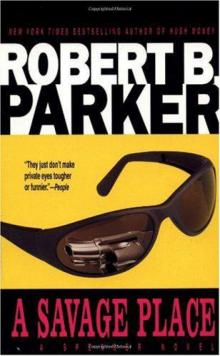 A Savage Place s-8
A Savage Place s-8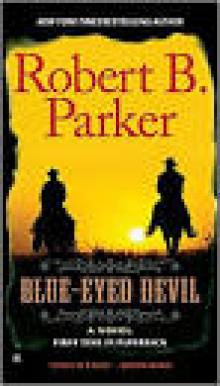 Appaloosa / Resolution / Brimstone / Blue-Eyed Devil
Appaloosa / Resolution / Brimstone / Blue-Eyed Devil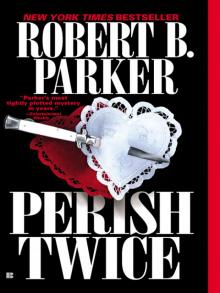 Perish Twice
Perish Twice Spare Change
Spare Change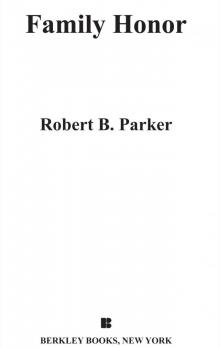 Family Honor
Family Honor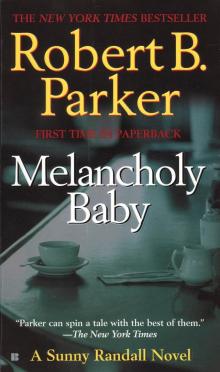 Melancholy Baby
Melancholy Baby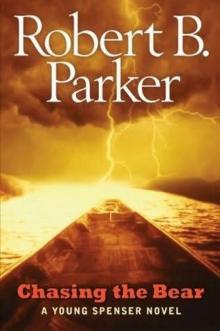 Chasing the Bear
Chasing the Bear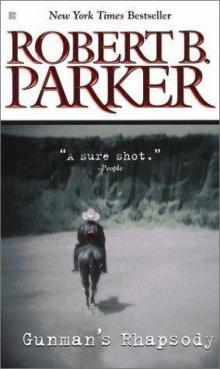 Gunman's Rhapsody
Gunman's Rhapsody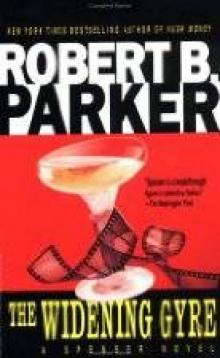 The Widening Gyre
The Widening Gyre Thin Air
Thin Air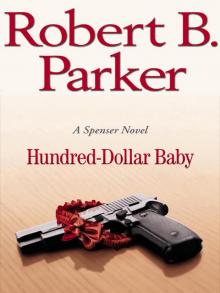 Hundred-Dollar Baby
Hundred-Dollar Baby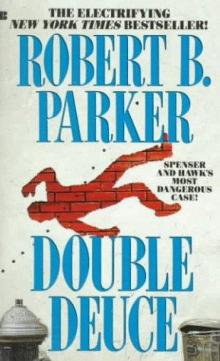 Double Deuce s-19
Double Deuce s-19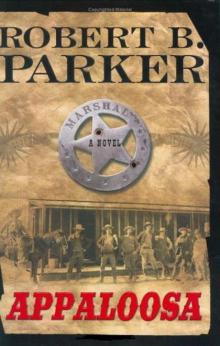 Appaloosa vcaeh-1
Appaloosa vcaeh-1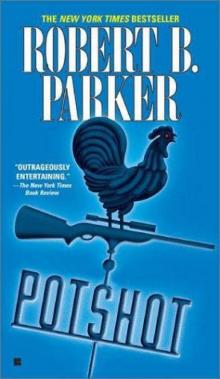 Potshot
Potshot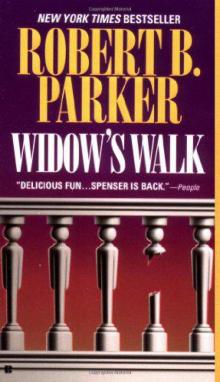 Widow’s Walk s-29
Widow’s Walk s-29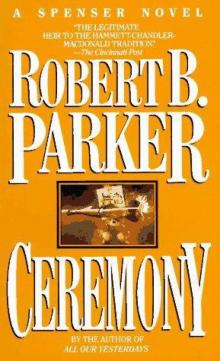 Ceremony s-9
Ceremony s-9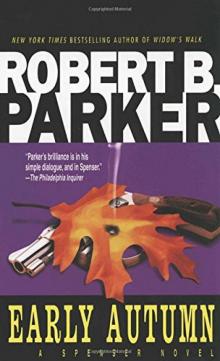 Early Autumn
Early Autumn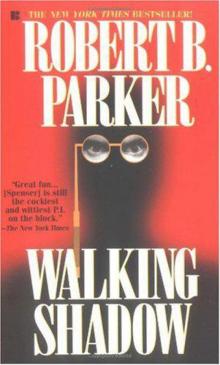 Walking Shadow s-21
Walking Shadow s-21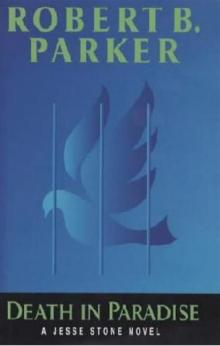 Death In Paradise js-3
Death In Paradise js-3 Shrink Rap
Shrink Rap Blue-Eyed Devil
Blue-Eyed Devil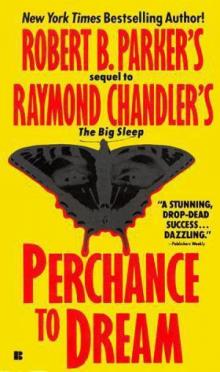 Perchance to Dream
Perchance to Dream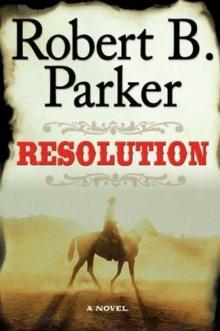 Resolution vcaeh-2
Resolution vcaeh-2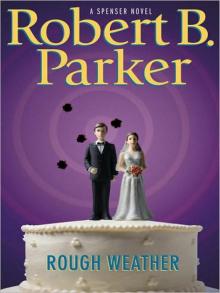 Rough Weather
Rough Weather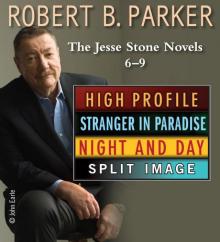 The Jesse Stone Novels 6-9
The Jesse Stone Novels 6-9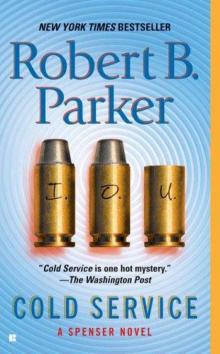 Cold Service s-32
Cold Service s-32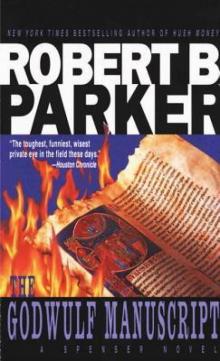 The Godwulf Manuscript
The Godwulf Manuscript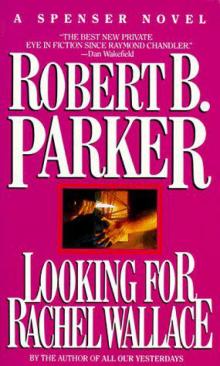 Looking for Rachel Wallace s-6
Looking for Rachel Wallace s-6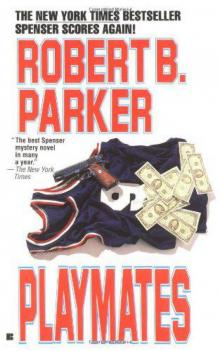 Playmates s-16
Playmates s-16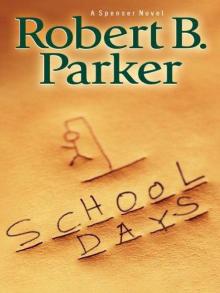 School Days s-33
School Days s-33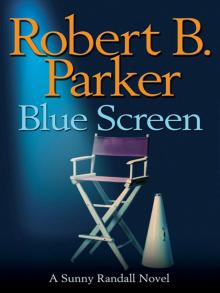 Blue Screen
Blue Screen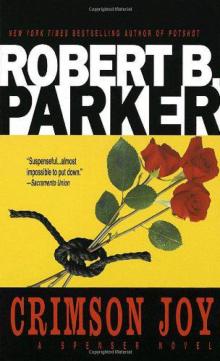 Crimson Joy
Crimson Joy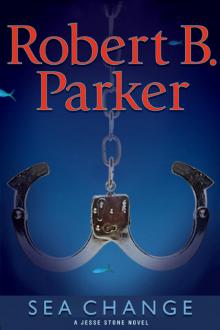 Sea Change js-5
Sea Change js-5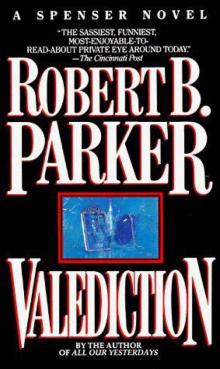 Valediction s-11
Valediction s-11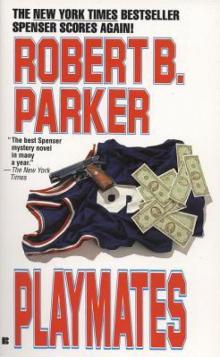 Playmates
Playmates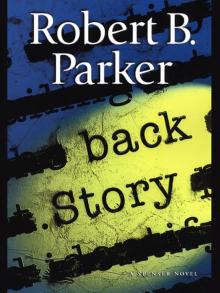 Back Story
Back Story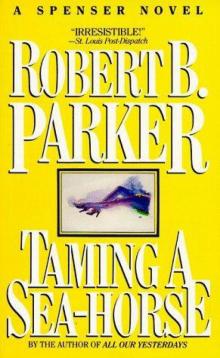 Taming a Sea Horse
Taming a Sea Horse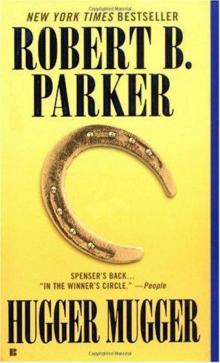 Hugger Mugger
Hugger Mugger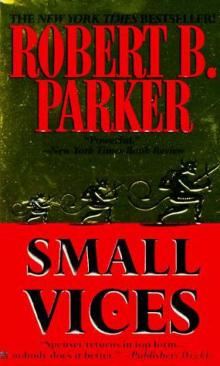 Small Vices s-24
Small Vices s-24 Silent Night: A Spenser Holiday Novel
Silent Night: A Spenser Holiday Novel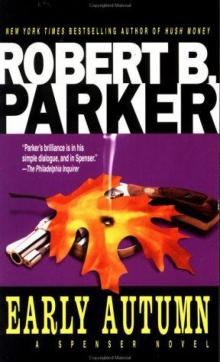 Early Autumn s-7
Early Autumn s-7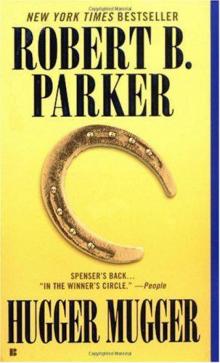 Hugger Mugger s-27
Hugger Mugger s-27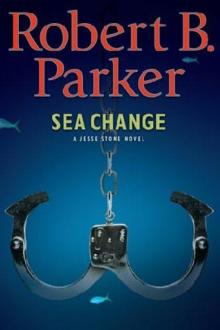 (5/10) Sea Change
(5/10) Sea Change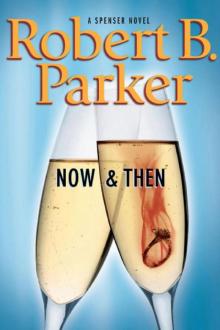 Now and Then
Now and Then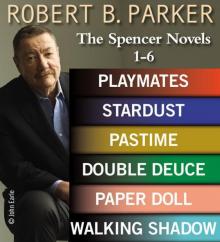 Robert B. Parker: The Spencer Novels 1?6
Robert B. Parker: The Spencer Novels 1?6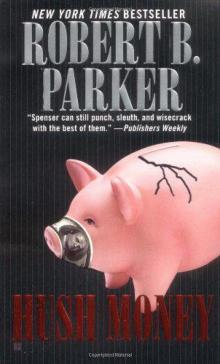 Hush Money s-26
Hush Money s-26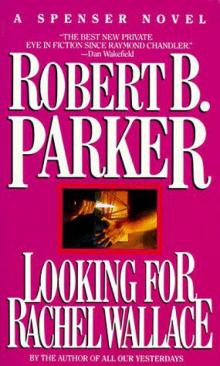 Looking for Rachel Wallace
Looking for Rachel Wallace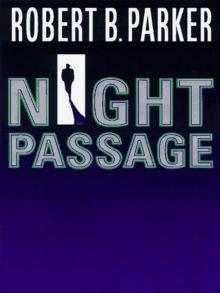 Night Passage
Night Passage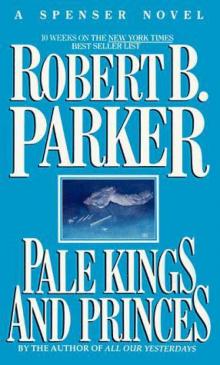 Pale Kings and Princes
Pale Kings and Princes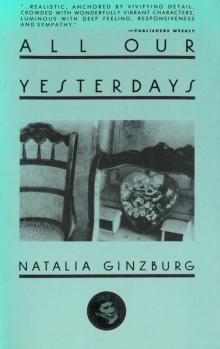 All Our Yesterdays
All Our Yesterdays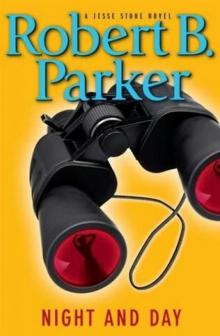 Night and Day js-8
Night and Day js-8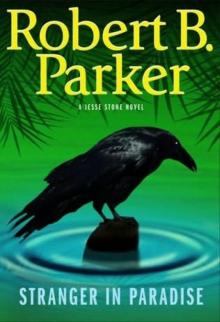 Stranger in Paradise js-7
Stranger in Paradise js-7 Double Play
Double Play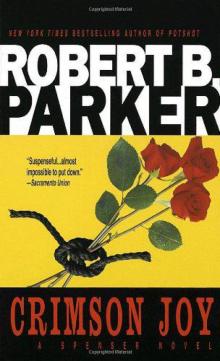 Crimson Joy s-15
Crimson Joy s-15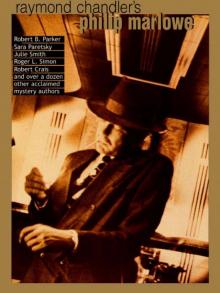 Raymond Chandler's Philip Marlowe
Raymond Chandler's Philip Marlowe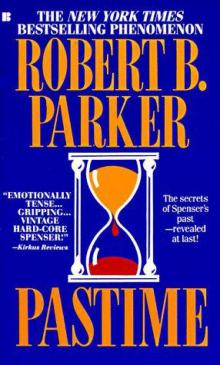 Pastime
Pastime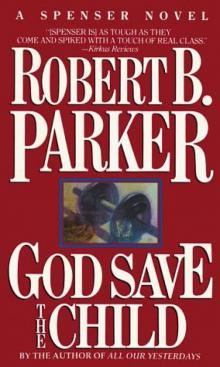 God Save the Child s-2
God Save the Child s-2 Bad Business
Bad Business Trouble in Paradise js-2
Trouble in Paradise js-2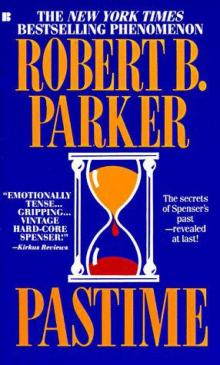 Pastime s-18
Pastime s-18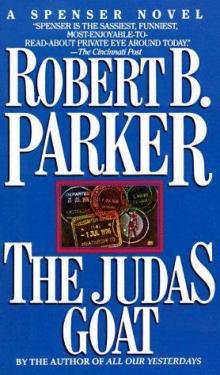 The Judas Goat s-5
The Judas Goat s-5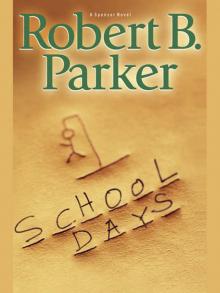 School Days
School Days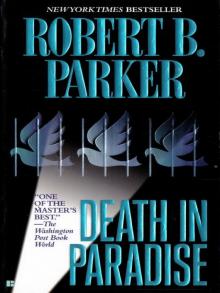 Death In Paradise
Death In Paradise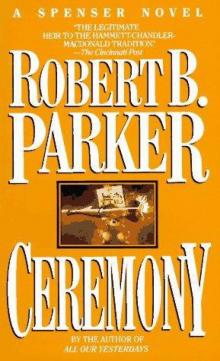 Ceremony
Ceremony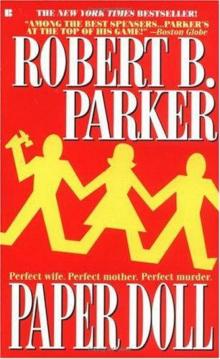 Paper Doll s-20
Paper Doll s-20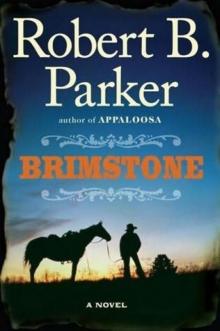 Brimstone vcaeh-3
Brimstone vcaeh-3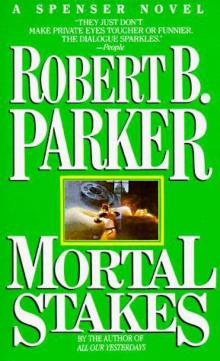 Mortal Stakes s-3
Mortal Stakes s-3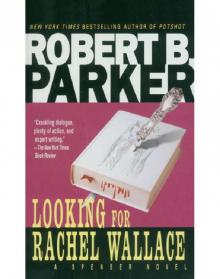 Spencer 06 - Looking for Rachel Wallace
Spencer 06 - Looking for Rachel Wallace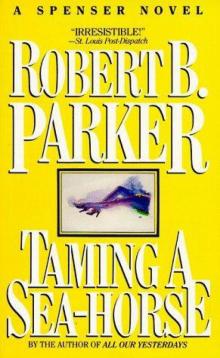 Taming a Sea Horse s-13
Taming a Sea Horse s-13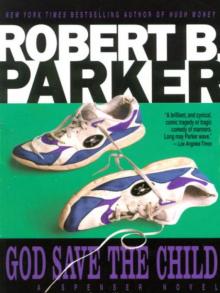 God Save the Child
God Save the Child Chance
Chance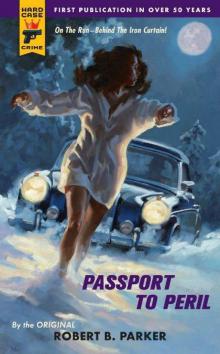 Passport To Peril hcc-57
Passport To Peril hcc-57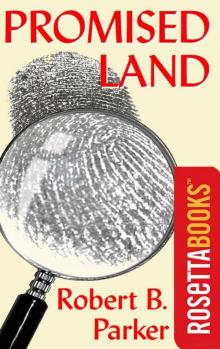 Promised Land
Promised Land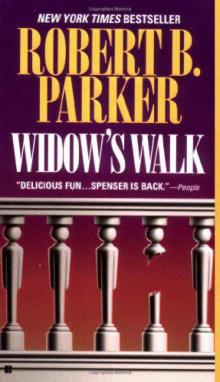 Widow’s Walk
Widow’s Walk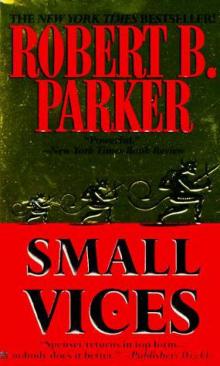 Small Vices
Small Vices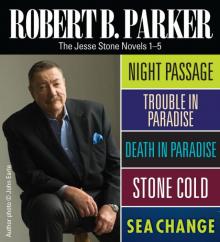 Robert B Parker: The Jesse Stone Novels 1-5
Robert B Parker: The Jesse Stone Novels 1-5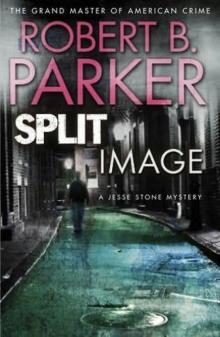 Split Image js-9
Split Image js-9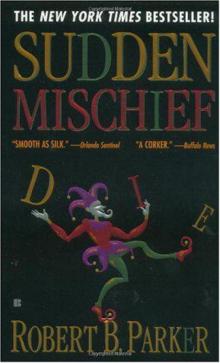 Sudden Mischief s-25
Sudden Mischief s-25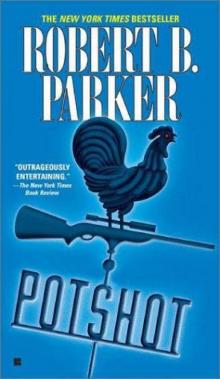 Potshot s-28
Potshot s-28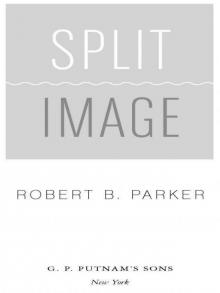 Split Image
Split Image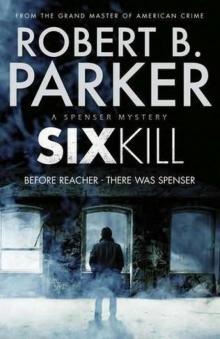 Sixkill s-40
Sixkill s-40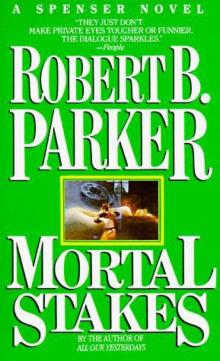 Mortal Stakes
Mortal Stakes Stardust
Stardust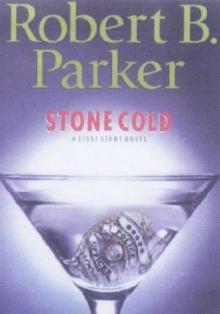 Stone Cold js-4
Stone Cold js-4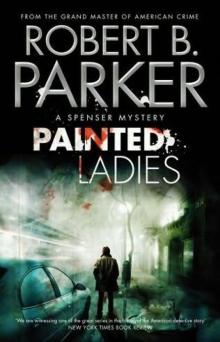 Painted Ladies s-39
Painted Ladies s-39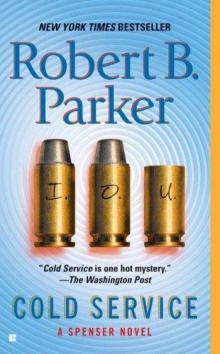 Cold Service
Cold Service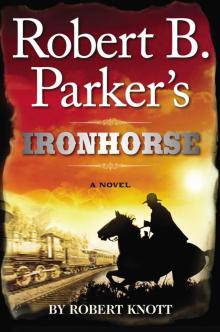 Ironhorse
Ironhorse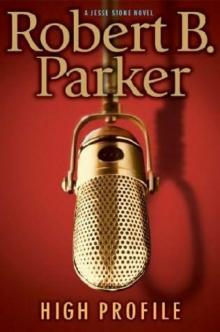 High Profile js-6
High Profile js-6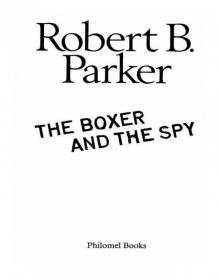 The Boxer and the Spy
The Boxer and the Spy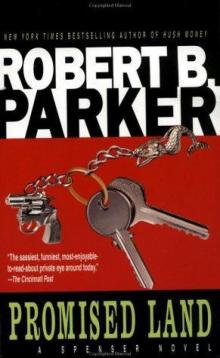 Promised Land s-4
Promised Land s-4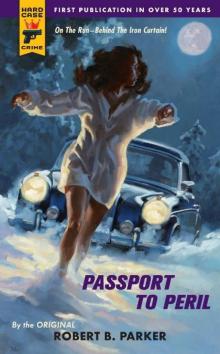 Passport to Peril (Hard Case Crime (Mass Market Paperback))
Passport to Peril (Hard Case Crime (Mass Market Paperback))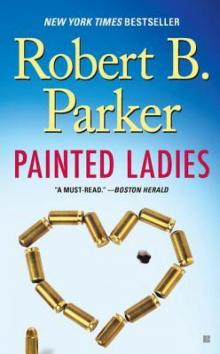 Painted Ladies
Painted Ladies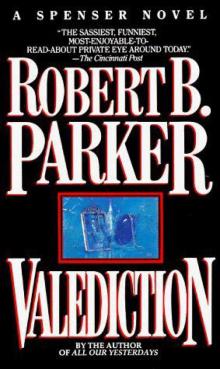 Valediction
Valediction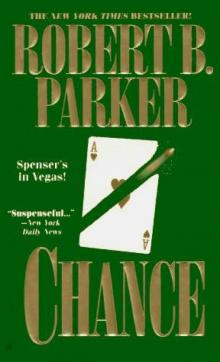 Chance s-23
Chance s-23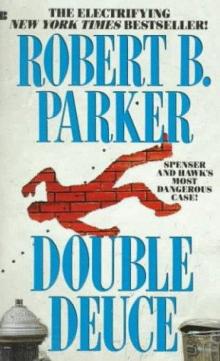 Double Deuce
Double Deuce Wilderness
Wilderness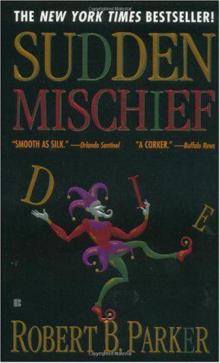 Sudden Mischief
Sudden Mischief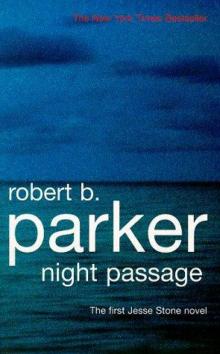 Night Passage js-1
Night Passage js-1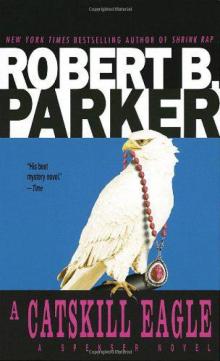 A Catskill Eagle
A Catskill Eagle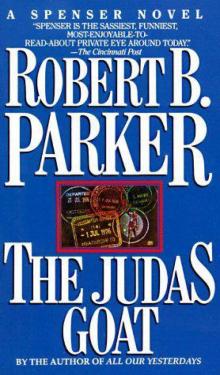 The Judas Goat
The Judas Goat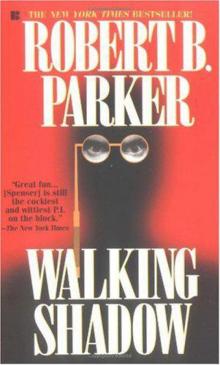 Walking Shadow
Walking Shadow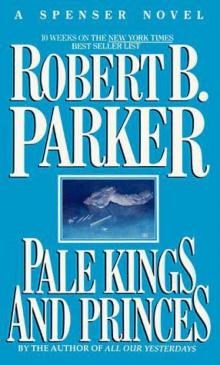 Pale Kings and Princes s-14
Pale Kings and Princes s-14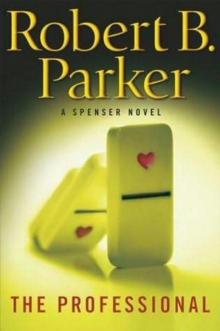 The Professional
The Professional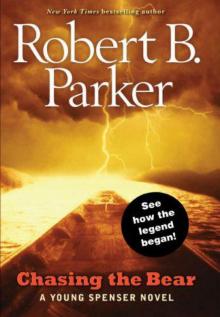 Chasing the Bear s-37
Chasing the Bear s-37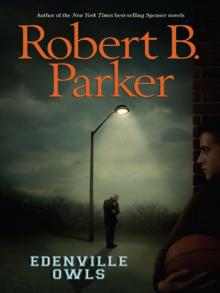 Edenville Owls
Edenville Owls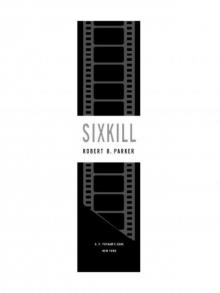 Sixkill
Sixkill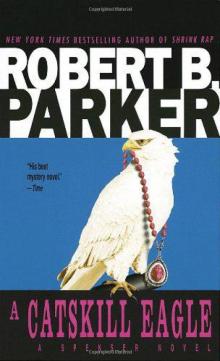 A Catskill Eagle s-12
A Catskill Eagle s-12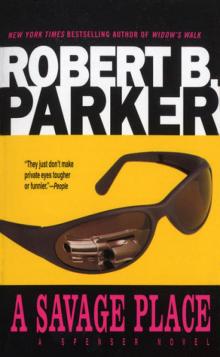 A Savage Place
A Savage Place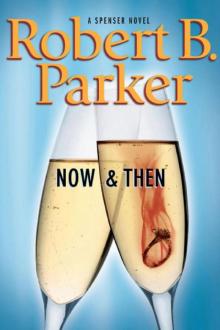 Now and Then s-35
Now and Then s-35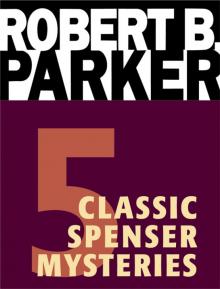 Five Classic Spenser Mysteries
Five Classic Spenser Mysteries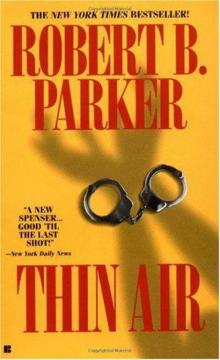 Thin Air s-22
Thin Air s-22